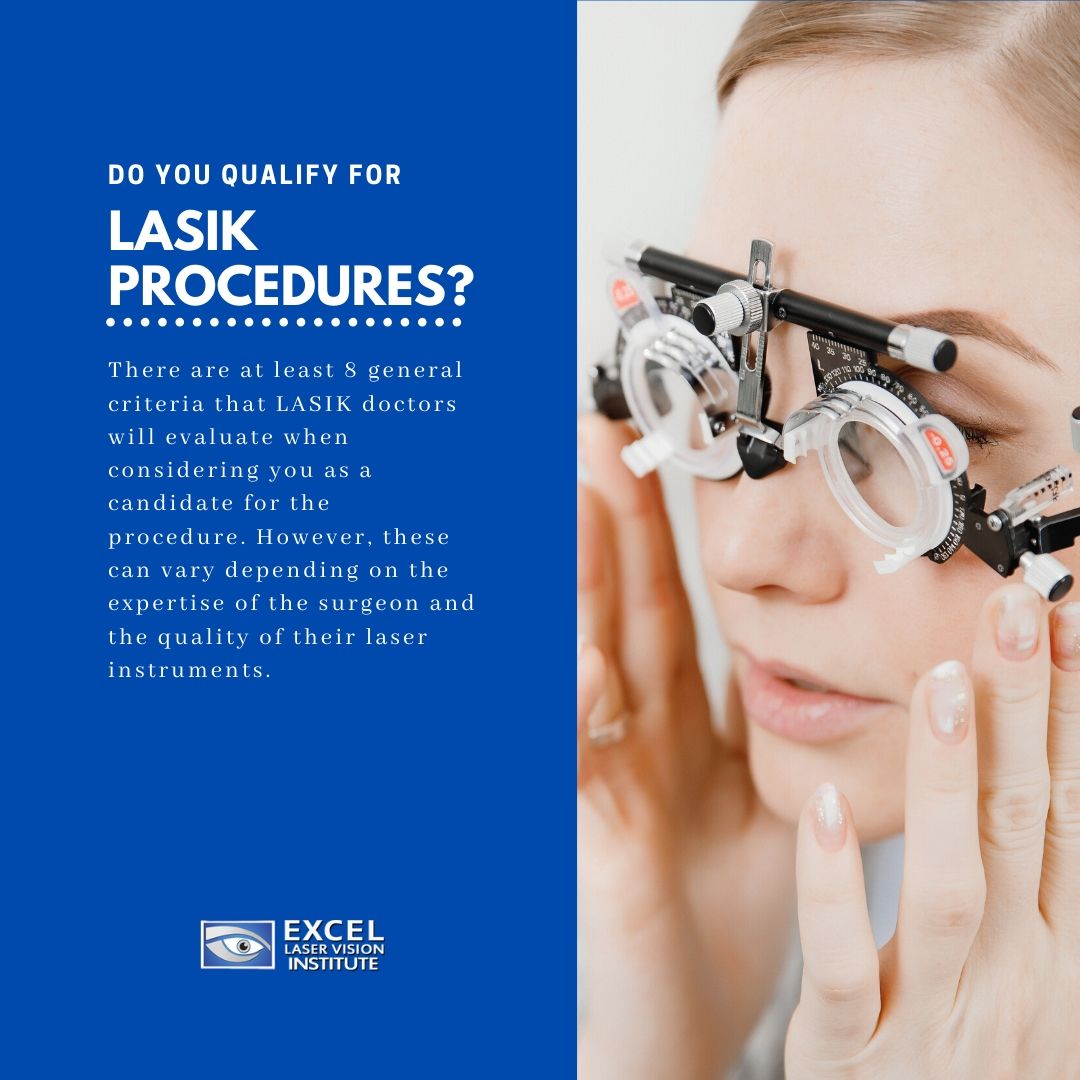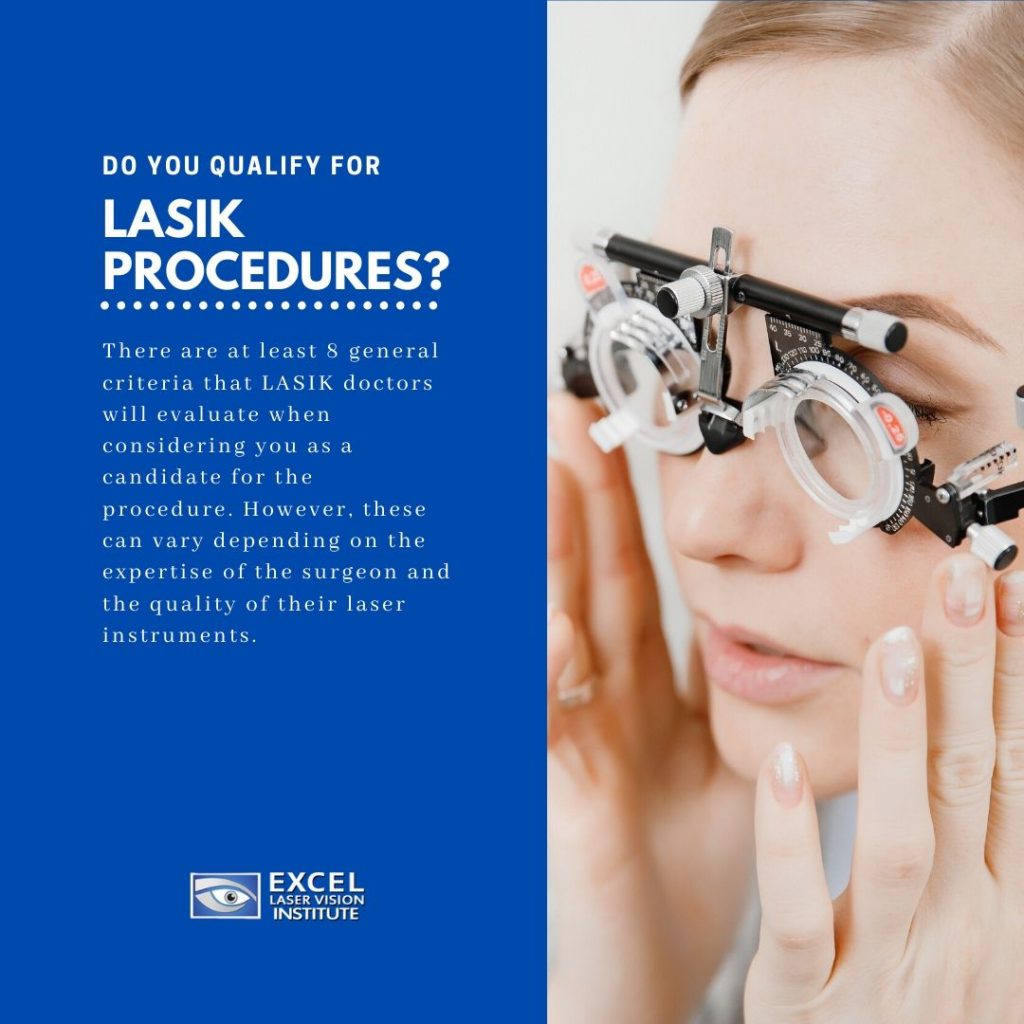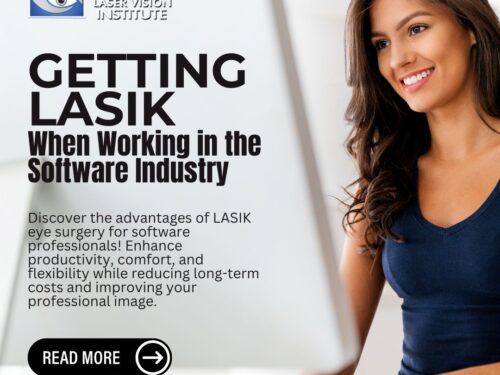
LASIK eye surgery has become extremely popular and widespread over the last few decades, which has prompted many people to wonder if they themselves qualify for the procedure. At LASIK clinics in Los Angeles like Excel Laser Vision Institute, doctors are highly selective when it comes to picking candidates for the surgery. Everything is tested, confirmed, and optimized to make the process safe and effective each time.

So, how do you know if you are eligible for laser eye surgery clinics such as Excel Laser Vision Institute? There are a few different factors. Once you have been tested to determine your eye health and prescription, your LASIK eye specialist in Loss Angeles will consult you about your eye care history and vision goals.
There are at least 8 general criteria that LASIK doctors will evaluate when considering you as a candidate for the procedure. However, these can vary depending on the expertise of the surgeon and the quality of their laser instruments. In order to fully determine if you are qualified for LASIK, you should schedule an eye examination and consultation at a LASIK eye center in Los Angeles like Excel Laser Vision Institute. In the meantime, though, you can read through our list and see how well your situation matches up with the qualities that LASIK eye surgeons are looking for.
Eye Health
When a LASIK Los Angeles eye specialist gives you an eye examination, they are looking at different aspects of your eye health that might be impacted by the surgery. Pre-existing eye conditions may or may not affect how well your eyes heal or how they will take to laser technology.
Temporary eye conditions like pink eye, dry eye, infections, or eye injuries can complicate the surgery. Thus, LASIK doctors in Los Angeles like Doctor Moosa will usually recommend that patients come back for LASIK after their eyes have fully healed from their previous condition.
It is always best to speak to a doctor about your past and current eye conditions so that you can eliminate any risk of complications when you are preparing for LASIK eye surgery. Some people have an extreme case of dry eye, which means that they do not produce enough moisture in their eyes to keep them lubricated, causing a burning or stinging sensation. People with this kind of condition may be more sensitive to LASIK and, thus, will require special attention or a vision correction alternative.
Cornea Size
When you are being evaluated for LASIK eye surgery, your eye examiner will check to see if your cornea is an appropriate size and shape for the procedure. This will determine if you are eligible for LASIK or more suited to an alternative like PRK. If you have a thinner cornea or it is an irregular shape, this could disqualify you for certain types of laser vision correction surgery. However, don’t be discouraged! Advances in laser technology have already made vision correction possible for people with many different eye conditions.
If you have not qualified for LASIK in the past, you may consider going into a LASIK clinic for a second opinion. Not only has technology improved, but certain clinics have better access to equipment and, thus, can successfully perform LASIK under more complicated circumstances. Even if you still cannot undergo the surgery, there may be vision correction alternatives that were made to accommodate your kind of eye condition and may even be better suited to your lifestyle. Consult an eye specialist to determine your best course of action to reach your vision goals.
Pupil Size
LASIK eye examiners will also check your pupil size. People with larger-sized pupils can sometimes experience halos, glares, and starbursts after their LASIK eye surgery. Therefore, LASIK eye surgeons will use a particular scale to determine whether your pupils fall within a safe range.
Prescription
Another important thing that doctors check when considering you as a candidate for LASIK is your prescription. Higher prescriptions were disqualified in the past because technology was not advanced enough to accommodate these eye conditions. However, the range of prescriptions that can be satisfied with LASIK surgery has significantly increased. Nowadays, doctors will utilize your prescription to recommend the best version of laser vision correction. Whether you have astigmatism, myopia, or hyperopia, your LASIK eye specialist will help you determine the best course of action to achieve your vision goals.
Age
Age will affect prescription, which is why LASIK doctors generally like to pay attention to this factor. For some younger people, eye prescriptions may not be stable enough to warrant the surgery. Generally, LASIK surgeons pick candidates who have maintained the same refractive errors with no variation for up to 12 months. Most LASIK procedures require you to be 18 or older; although, there are some exceptions.
For patients over 40, LASIK is still a viable solution for vision correction. However, it may not fix all vision problems. Some LASIK patients over 40 will still require reading glasses for their presbyopia. In other cases, eye specialists will recommend a monovision LASIK procedure or other options to fully target vision issues.
Both women and men are susceptible to dry eye conditions later in life, which must be considered by the eye surgeon before LASIK is performed.
General Health
While LASIK is mostly concerned with eye health, a person’s general health is still a big factor in determining the safety and effectiveness of the procedure. Certain autoimmune diseases or degenerative conditions will disqualify a candidate for the elective surgery. However, it all depends on the patient’s condition and the doctor’s experience in similar cases.
LASIK surgeons will also consider the types of medications that patients take on a daily basis. Some prescription drugs can have a negative effect on post-operative recovery or increase symptoms like dry eye.
Pregnancy
Most LASIK surgeons will advise pregnant or nursing women to wait until their hormonal cycles have regulated before they come in for the surgery. Hormones can affect eye conditions like the size and shape of the cornea or dry eye symptoms.
Generally, the medications before and after LASIK surgery are also not recommended for pregnant or nursing women, which is why it is best to wait a few months before having the procedure performed.
Vision Goals
Lastly, your doctor will want to talk to you about your expectations for LASIK and ensure that you are satisfied in your choice of corrective eye surgery. For your lifestyle and prescription, LASIK may or may not be the right option. However, there are an array of refractive surgery alternatives that can serve to help you achieve your vision goals.



